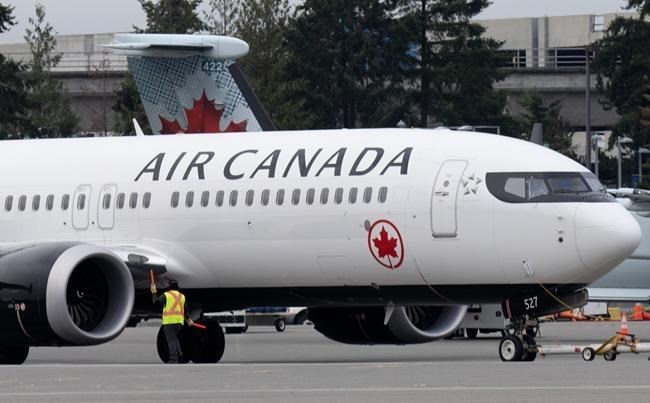
Air Canada is appealing a decision by the country’s transport regulator that seeks to boost accessibility for travellers living with a disability.An Air Canada jet is manoeuvred on the tarmac at the airport, Wednesday, Nov.15, 2023 in Vancouver. THE CANADIAN PRESS/Adrian Wyld
Republished January 11, 2024 - 4:28 PM
Original Publication Date January 11, 2024 - 9:01 AM
MONTREAL - Air Canada has appealed a decision by the country’s transport regulator that seeks to boost accessibility for travellers living with a disability.
If successful, the move would overturn a requirement to fully accommodate passengers whose wheelchairs are too large to move into airplane cargo holds.
The Canadian Transportation Agency's ruling marks the culmination of a case that has dragged on since 2016, when flier Tim Rose was told his power wheelchair wouldn't fit on the aircraft, preventing him from travelling to Ohio as planned.
After a series of decisions, the regulator ruled in 2023 that Air Canada must either find passengers with disabilities a similar flight on a comparable route or swap in a plane that is capable of carrying the mobility device.
Rose called Air Canada's appeal "sad and unfortunate."
“It was really disappointing," he said, particularly as the airline touted new measures last year that it said would improve the travel experience for passengers with a disability.
“I feel like Air Canada is talking out of both sides of its mouth right now. The hypocrisy is on the one hand they’re suggesting that they’re trying to improve ... on the other hand they’re continuing to fight my already decided ruling that provides dignity and accessibility to all Canadians who are wheelchair users.”
Air Canada says it has accepted most of the ruling's orders to remove barriers, including the obligation to find a plane that takes off within a day of the desired travel date, as long as the customer makes the request three weeks in advance.
"What we are challenging is the obligation to change aircraft planned for a route with short notice, on an ad-hoc basis," said spokesman Peter Fitzpatrick.
In the summer of 2016, Rose was informed he couldn't book a flight from Toronto to Cleveland — "ironically enough, to give a presentation about disability awareness in big business," he said.
“When I told the representative on the Air Canada medical desk that this was discriminatory, she said, 'No, your wheelchair’s just like a piece of luggage. If it doesn't fit, it doesn't fit.'
"It's my mobility. You would not call someone's legs luggage," said Rose, an accessibility consultant who lives with cerebral palsy. "In this case, they didn't even let my legs on the plane."
In 2022, a transportation agency tribunal found that he and all people who use larger mobility aids face "undue obstacles" to mobility at Air Canada. The decision came after a drawn-out back-and-forth between the two parties, a 2019 decision establishing that there were hurdles to mobility but not necessarily undue ones, and a COVID-19-induced pause on proceedings.
The subsequent ruling from 2023 noted the airline deploys spare planes "on a daily basis" in response to everything from inclement weather to mechanical issues, and so should occasionally be able to do the same for accessibility.
"Because Air Canada regularly substitutes aircraft in the case of irregular operations, it is unlikely that doing so to accommodate a person with a disability would have a significant impact on the rights of other passengers or Air Canada’s ability to provide customer service," the Aug. 11 decision states.
In its Dec. 21 notice of appeal, Air Canada argues that the requirement to swap in planes with larger cargo doors — some are just over two-and-a-half feet high, while many power wheelchairs can be collapsed only to a height of three feet — marks an "undue hardship" for the carrier, putting it at a competitive disadvantage.
The agency failed to consider all factors or apply the proper analysis for what constitutes that difficulty, the filing claims.
First kicked off in September, the appeal process began a couple of months before Air Canada CEO Michael Rousseau apologized for the airline's accessibility shortfalls.
In a press release, he said the carrier would speed up a three-year accessibility plan after a number of recent reports of passenger mistreatment, including an incident where a man with spastic cerebral palsy was forced to drag himself off of an airplane in Las Vegas due to a lack of assistance.
"Air Canada recognizes the challenges customers with disabilities encounter when they fly and accepts its responsibility to provide convenient and consistent service so that flying with us becomes easier. Sometimes we do not meet this commitment, for which we offer a sincere apology," the chief executive said on Nov. 9.
The measures in the airline's plan range from establishing a customer accessibility director to consistently boarding passengers who request lift assistance first. Air Canada also aims to implement annual, recurrent training in accessibility — such as how to use an eagle lift — for its 10,000 airport employees and include mobility aids in an app that can track baggage.
"It’s been so difficult to reconcile those remarks with our experience with Air Canada, because their obligation pursuant to accessibility planning is the very thing that they’re fighting against in this case," said Ilinca Stefan, a lawyer with the ARCH Disability Law Centre, which represents Rose.
The airline’s appeal also contests the regulator’s order that it factor power wheelchair accommodation into its accessibility plan, specifically when it comes to aircraft purchases and selection on Canada-U.S. routes.
The agency “does not have the jurisdiction or power to impose content” on that plan, Air Canada said in a filing last year.
This report by The Canadian Press was first published Jan. 11, 2024.
Companies in this story: (TSX:AC)
News from © The Canadian Press, 2024